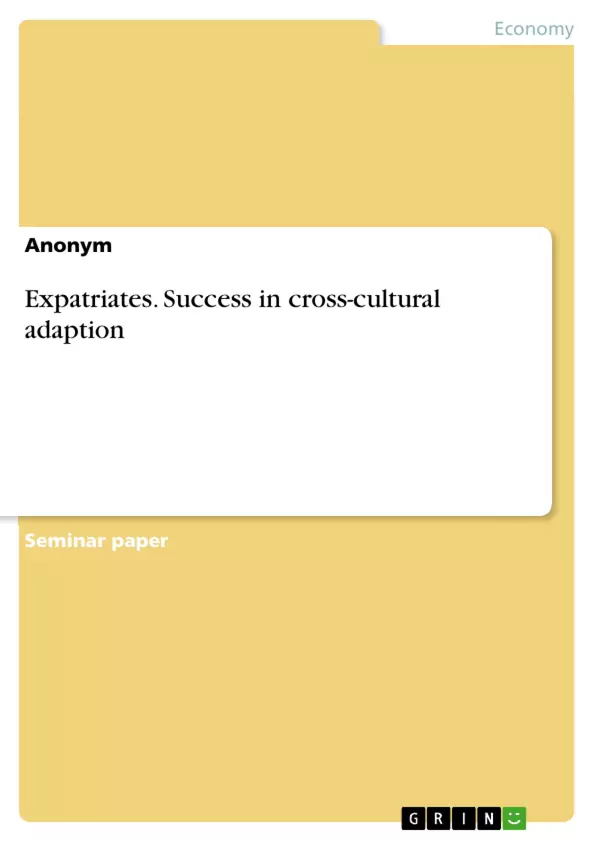The internationalisation of the economy is evident in many areas. The exchange of goods services and technologies, as well as the foreign direct investments (FDIs) of multinational companies (MNCs), increased rapidly over the past decades. The increased FDI volume led to an increasing number of expatriates that are sent from MNCs to observe and support the successful implementation of the investment. Expatriates are getting in contact with a new and unknown culture, which might cause problems in cross-cultural interaction.
Many different studies show that a significant share of foreign assignments fails. In the studies, the share varies between 16-40 % of expatriates that fail to execute their business tasks and/or are not able to adapt to the new culture and environment. This can cause tremendous costs and loss of image for the MNC.
The objective of this scientific paper is to define success and failure in cross-cultural adaption as an expatriate. It should become clear which characteristics and skills are particularly important in the selection process. Different measures should be presented that increase the chance of success for effective implementation of the business task, as well as intercultural integration.
The scientific paper contains four chapters. At the beginning of chapter two, the key terms culture and expatriate are defined before their relation gets explained. Afterwards, possible problems and conflicts during the cross-cultural adaption in the new living and working environment are stated.
In the new culture, many expatriates experience a culture shock. The w-curve model shows the emergence and recovery of a culture shock in the new country and after returning home. Then important skills and criteria for selecting are explained to find the most suitable expatriate. The second chapter ends with pre-departure measures that can enable a faster and better cultural-adaption process for the expatriate.
The third chapter contains a case study based on a German expatriate in China. The cultural standards of the two countries are compared to discover cultural differences. Various measures are given to show how the execution of the business task and the cross-cultural adaption can be successful.
In the last chapter, the key findings of this paper are summarised. The paper ends with a conclusion and an outlook, where further significant research needs are addressed.
Inhaltsverzeichnis (Table of Contents)
- Abstract
- List of abbreviations
- List of figures
- The expatriate a risk factor in intercultural cooperation
- Expatriates and cross-cultural adaption
- Definition and composition of culture
- Expatriates and the necessity of cross-cultural adaption
- Possible conflicts and culture shocks of expatriates
- Selection process and characteristics of expatriates
- Preparation of the expatriate for the assignment abroad
- Case study: German expatriate in China
- Development and attractiveness of the Chinese market for MNC
- German culture standards
- Chinese culture standards
- Possible cultural conflicts for German expatriates in China
- Measures for success in the cross-cultural adaptation as German expatriate in China
- Summary, conclusion, and outlook
- Bibliography
Zielsetzung und Themenschwerpunkte (Objectives and Key Themes)
This seminar paper aims to define success in cross-cultural adaption for expatriates and present methods that can help achieve it. It explores theoretical approaches to identify and avoid potential conflicts in intercultural interactions, testing these theories in a case study of a German expatriate in China.
- Defining success in cross-cultural adaption
- Identifying potential conflicts in intercultural interactions
- Analyzing cultural standards and their impact on expatriate experiences
- Developing strategies for successful cross-cultural adaption
- Applying theoretical concepts to a real-world case study
Zusammenfassung der Kapitel (Chapter Summaries)
The first chapter introduces the challenges expatriates face in intercultural cooperation. It highlights the rising importance of cross-cultural adaption in today's globalized world and emphasizes the potential risks associated with failing to adapt effectively.
The second chapter delves into the concept of cross-cultural adaption. It defines and explains the components of culture, explores the necessity of adaption for expatriates, and examines the potential conflicts and culture shocks they may encounter. Additionally, it discusses the selection process for expatriates and the importance of preparation for their overseas assignment.
The third chapter presents a case study focused on a German expatriate in China. It analyzes the development and attractiveness of the Chinese market for multinational companies, examines the cultural standards of both Germany and China, and identifies potential cultural conflicts that the German expatriate might encounter. Finally, it suggests measures to facilitate successful cross-cultural adaption in this specific context.
Schlüsselwörter (Keywords)
The paper focuses on key terms and concepts related to expatriates and cross-cultural adaption. These include: expatriates, cross-cultural adaption, culture standards, intercultural competence, intercultural, culture shock, reintegration process, intercultural training, German expatriate in China.
Frequently Asked Questions
What is an expatriate?
An expatriate is an employee sent by a multinational corporation (MNC) to work in a foreign country to support investments or implement business tasks.
Why do many foreign assignments fail?
Studies show failure rates of 16-40%, often due to the expatriate's inability to adapt to the new culture, environment, or a lack of intercultural competence.
What is a "culture shock" in the context of expatriates?
It is a psychological state of disorientation experienced when moving to a new culture, often described by the "W-curve model" showing the dip and eventual recovery of well-being.
Which skills are important for selecting a successful expatriate?
Key characteristics include intercultural competence, flexibility, communication skills, and the ability to handle stress in unknown environments.
How can MNCs prepare expatriates for their assignments?
Preparation measures include pre-departure intercultural training, language courses, and providing information about the host country's cultural standards.
What are the specific challenges for German expatriates in China?
The case study explores differences in cultural standards between Germany and China, identifying potential conflicts in communication and business etiquette.
- Citation du texte
- Anonym (Auteur), 2020, Expatriates. Success in cross-cultural adaption, Munich, GRIN Verlag, https://www.grin.com/document/1010331



